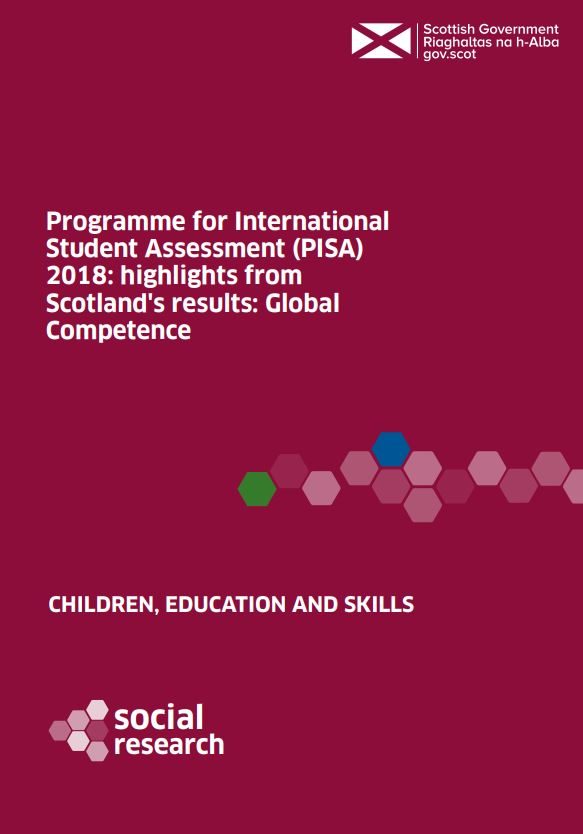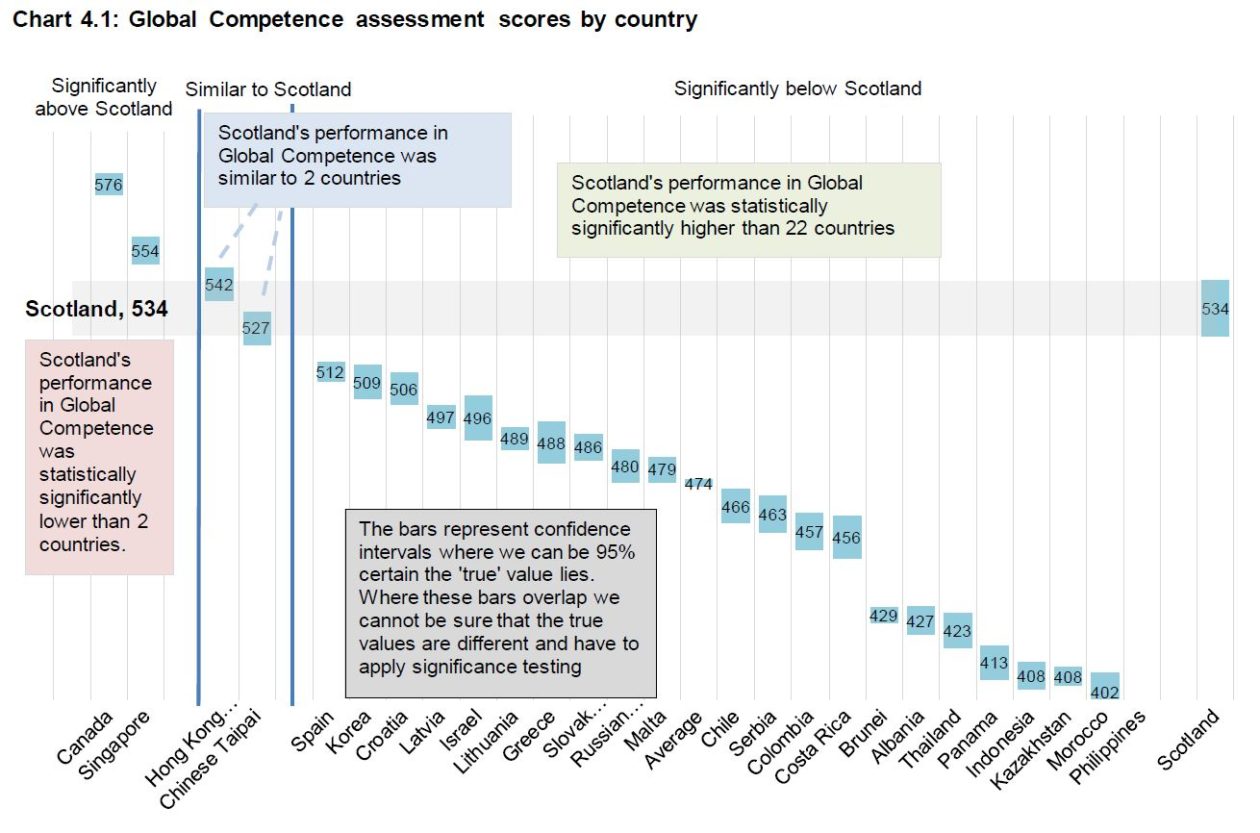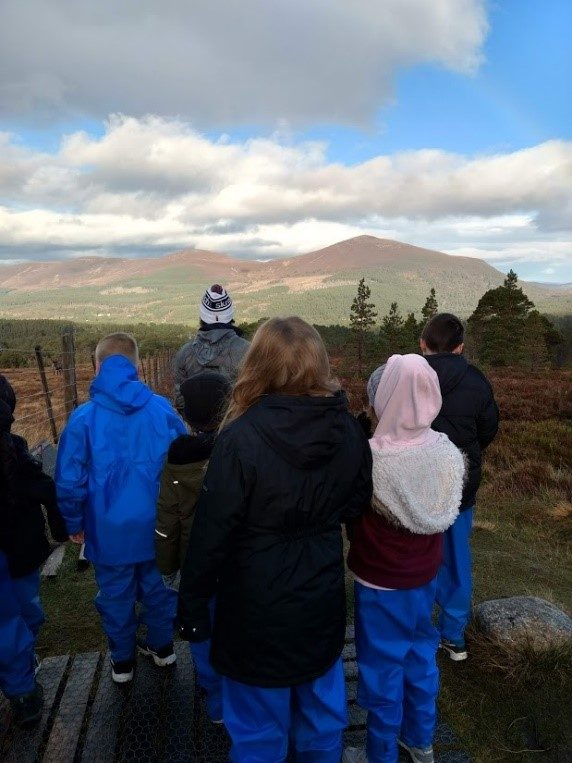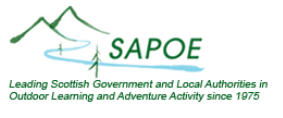 Latest OECD PISA survey reflects learners’ positive attitudes and respect for others
Latest OECD PISA survey reflects learners’ positive attitudes and respect for others
Pupils in Scotland have higher than average awareness of global issues, according to an international survey run by the Organisation for Economic Cooperation and Development (OECD).
Data from the OECD’s Programme for International Student Assessment (PISA) on ‘global competence’ – defined as the ability to examine global and intercultural issues and understand and appreciate different perspectives – also found pupils in Scotland have very positive attitudes towards immigrants and respect for people from other parts of the world.
The assessment included a test which assessed pupils’ knowledge and understanding of global issues and the world views of others. Only two countries out of 27 who took part scored higher than Scotland.
Some of the other highlights include:
- Scotland’s average score in the global competence assessment was 534 which was higher than the average of all participating countries of 474.
- Scotland’s average score in the global competence assessment was 534. It was one of five countries to score at least 50 points above the average.
- Twelve per cent of students in Scotland were assessed at Level 5, the highest level in the assessment, compared to 4.3% of students across all countries.
- Girls outperformed boys in every country taking part in the assessment, with the exception of Scotland where performance was similar.
- The global issues that students in Scotland were most familiar with were causes of poverty (87% of students), equality between men and women (85%), and climate change/global warming (78%).
- A higher proportion of students in Scotland (81.4%) reported thinking of themselves as a citizen of the world than the OECD average (76.2%).
- Almost two-thirds of students in Scotland (64.2%) reduce the amount of energy that they use at home to protect the environment.
- More than 4 out of 5 students (82.2%) were in a school where teachers felt they could adapt their teaching to the cultural diversity of students.
- Students in Scotland were among the 10 countries/economies (out of 66) with the most positive attitudes towards immigrants.
Deputy First Minister John Swinney said:
“One of the core aims of Curriculum for Excellence is that Scotland’s young people become responsible citizens with a knowledge and understanding of the world and Scotland’s place in it. This survey shows CfE is working – our pupils are highly aware of issues beyond our borders and they are respectful of people from other parts of the world.
“Since this data was collected, a wide-ranging action plan has been published to make it easier for schools to cover important global issues such as climate change and a sustainable economy. This continuing work will help teachers equip our young people with the skills and knowledge to be active global citizens so they can contribute to sustainability goals, flourish in the global economy and contribute to the international community.”
Download the PISA 2018 Global Competence Report
- The PISA 2018 Global Competence: Scotland’s Results Report can be accessed from the Scottish Government website: https://www.gov.scot/news/embracing-global-citizenship/
- The PISA 2018 Results: Are Students Ready to Thrive in an Interconnected World? Volume VI Report is available here: https://www.oecd-ilibrary.org/docserver/d5f68679-en.pdf?expires=1603360698&id=id&accname=guest&checksum=81034C49E62E3148DED37A6ADADE2842
Further links and resources
- Read Scotland’s Vision 2030+ Report and Action Plan.
- Visit Education Scotland’s National Improvement Hub Summary Page for Learning for Sustainability.
- Access a wide range of resources from our Outdoor Learning/Learning for Sustainability Wakelet.
- Follow us on Twitter @EdScotLfS #ThisisLfS #TimeforLfS
Background
The PISA assessment was conducted in Scotland in 2018 across 107 schools and 2,969 pupils. Students in 27 countries/economies, including Scotland, sat both a Global Competence cognitive test and completed a Global Competence questionnaire. Students in a further 39 countries/economies completed the Global Competence questionnaire only. The other UK nations did not take part in the Global Competence test or questionnaire.
Scotland’s curriculum – Curriculum for Excellence – helps children and young people gain the knowledge, skills and attributes needed for life in the 21st century, with the skills associated with global competence an important part of the curriculum framework. The Refreshed Curriculum Narrative for Scotland’s curriculum is available here.
An important cross-curricular theme within Scotland’s curriculum is the theme of Learning for Sustainability – an approach to life and learning which enables learners, educators, schools and their wider communities to build a socially just, sustainable and equitable society. Further information on Learning for Sustainability is available here.







